1 December 2020 – “We are delighted to welcome the new Young Investigators to the EMBO community and look forward to support them in leading and further developing their independent laboratories,” says EMBO Director Maria Leptin. “These 30 life scientists have demonstrated scientific excellence and are among the next generation of leading life scientists. Their participation in the EMBO Young Investigator Programme will help them in this critical phase of their careers.”
The EMBO Young Investigator Programme supports life scientists who have been group leaders for less than four years and have an excellent track record of scientific achievements. They must carry out their research in an EMBC Member State, an EMBC Associate Member State (currently India and Singapore) or in countries or territories covered by a co-operation agreement (currently Taiwan and Chile).
EMBO Young Investigators receive an award of 15,000 euros in the second year of their tenure and can apply for additional grants of up to 10,000 euros per year. They also benefit from a variety of networking opportunities for them and their lab members, mentoring by EMBO Members, training in research leadership and management as well as responsible conduct of research, and access to core facilities at the European Molecular Biology Laboratory (EMBL) in Heidelberg, Germany.
This year’s Young Investigators are based in nine EMBC Member States as well as India and Taiwan. Eleven new EMBO Young Investigators are female (37%) and nineteen are male (63%). The success rate was 14% and the programme received 216 eligible applications.
The next application deadline is 1 April 2021. More information about the programme, including eligibility criteria and the application process, is available at: https://www.embo.org/funding-awards/global-investigators
| EMBO Young Investigator | Research interest | Affiliation | Location |
|
|---|---|---|---|---|
 | Alejo Efeyan | Interplay of nutrients, hormones and human disease | Spanish National Cancer Research Center (CNIO) | Madrid, ES |
 | Andela Saric | Computational biological and soft matter physics | University College London | London, UK |
 | Benjamin D. Engel | Interplay between organelle form and function | Helmholtz Zentrum München | Neuherberg, DE |
 | Björn Burmann | Structural and dynamical adaptions of protein machines | University of Gothenburg | Gothenburg, SE |
 | Camilo Perez | Molecular mechanism of cell wall membrane proteins | Biozentrum, University of Basel | Basel, CH |
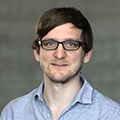 | Christoph Zechner | Signal processing and heterogeneity in biological systems | Max Planck Institute of Molecular Cell Biology and Genetics | Dresden, DE |
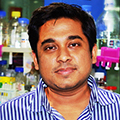 | Debojyoti Chakraborty | RNA signatures in cell-fate decisions | CSIR-Institute of Genomics & Integrative Biology | New Delhi, IN |
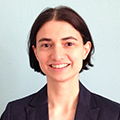 | Elodie Segura | Biology of human antigen-presenting cells | Institut Curie | Paris, FR |
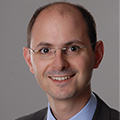 | Emmanuel Saliba | Single-cell analysis of bacterial infection | Helmholtz Institute for RNA-based Infection Research (HIRI) | Würzburg, DE |
 | Guoliang Cui | T-cell metabolism | German Cancer Research Center (DKFZ) | Heidelberg, DE |
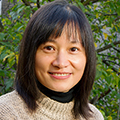 | Hansong Ma | Genetics of mitochondrial DNA in evolution and disease | Gurdon Institute, University of Cambridge | Cambridge, UK |
 | Ines Anna Drinnenberg | Evolution of centromeres and chromosome segregation | Institut Curie | Paris, FR |
 | Julia Santiago | Plant signaling mechanisms | University of Lausanne | Lausanne, CH |
 | Julian Stingele | Maintenance of genome stability | Ludwig-Maximilians-Universität | Munich, DE |
 | Julien Duxin | Mechanisms of DNA repair and DNA replication | University of Copenhagen | Copenhagen, DK |
 | Leila Akkari | Macrophages in cancer | Netherlands Cancer Institute (NKI) | Amsterdam, NL |
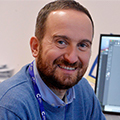 | Luca Tiberi | Regulation of neural stem cell and neuron biology in brain disorders and cancer | University of Trento | Trento, IT |
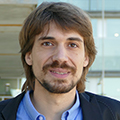 | Marc Güell | Translational synthetic biology | Pompeu Fabra University (UPF) | Barcelona, ES |
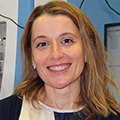 | Maria Robles | Temporal dynamics of proteins | Ludwig-Maximilians-Universität | Munich, DE |
 | Martijn Luijsterburg | Transcription and DNA repair | Leiden University Medical Centre | Leiden, NL |
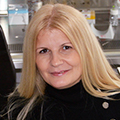 | Mina Gouti | Stem cell modeling of development and disease | Max Delbrück Center for Molecular Medicine | Berlin, DE |
 | Nicholas M. I. Taylor | Mechanism and regulation of transport across the membrane | University of Copenhagen | Copenhagen, DK |
 | Nicholas McGranahan | Cancer genome evolution | University College London | London, UK |
 | Nuria Montserrat | Pluripotency for organ regeneration | Institute for Bioengineering of Catalonia (IBEC) | Barcelona, ES |
 | Sam Behjati | Developmental origins of cancer | Wellcome Sanger Institute | Hinxton, UK |
 | Saravana Ramasamy | Integrative Skeletal Physiology | Imperial College London | London, UK |
 | Simon Bekker-Jensen | Molecular details of cellular stress responses | University of Copenhagen | Copenhagen, DK |
 | Tanmay Bharat | Structural cell biology of bacterial biofilm formation | University of Oxford | Oxford, UK |
 | Verena Ruprecht | Cell and tissue dynamics | Centre for Genomic Regulation (CRG) | Barcelona, ES |
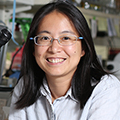 | Yen-Ping Hsueh | Molecular interactions between C.elegans and nematode-trapping fungi | Academia Sinica | Taipei, TW |



